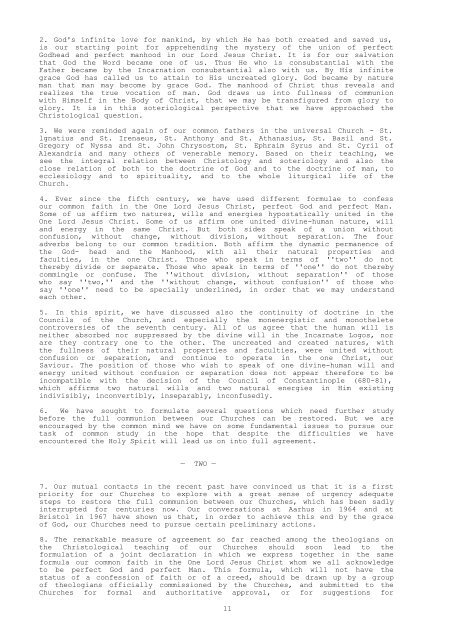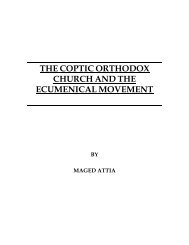Coptic interpretations of the Fourth Ecumenical Council - Saint Mina ...
Coptic interpretations of the Fourth Ecumenical Council - Saint Mina ...
Coptic interpretations of the Fourth Ecumenical Council - Saint Mina ...
You also want an ePaper? Increase the reach of your titles
YUMPU automatically turns print PDFs into web optimized ePapers that Google loves.
2. God's infinite love for mankind, by which He has both created and saved us,<br />
is our starting point for apprehending <strong>the</strong> mystery <strong>of</strong> <strong>the</strong> union <strong>of</strong> perfect<br />
Godhead and perfect manhood in our Lord Jesus Christ. It is for our salvation<br />
that God <strong>the</strong> Word became one <strong>of</strong> us. Thus He who is consubstantial with <strong>the</strong><br />
Fa<strong>the</strong>r became by <strong>the</strong> Incarnation consubstantial also with us. By His infinite<br />
grace God has called us to attain to His uncreated glory. God became by nature<br />
man that man may become by grace God. The manhood <strong>of</strong> Christ thus reveals and<br />
realizes <strong>the</strong> true vocation <strong>of</strong> man. God draws us into fullness <strong>of</strong> communion<br />
with Himself in <strong>the</strong> Body <strong>of</strong> Christ, that we may be transfigured from glory to<br />
glory. It is in this soteriological perspective that we have approached <strong>the</strong><br />
Christological question.<br />
3. We were reminded again <strong>of</strong> our common fa<strong>the</strong>rs in <strong>the</strong> universal Church - St.<br />
lgnatius and St. Irenaeus, St. Anthony and St. Athanasius, St. Basil and St.<br />
Gregory <strong>of</strong> Nyssa and St. John Chrysostom, St. Ephraim Syrus and St. Cyril <strong>of</strong><br />
Alexandria and many o<strong>the</strong>rs <strong>of</strong> venerable memory. Based on <strong>the</strong>ir teaching, we<br />
see <strong>the</strong> integral relation between Christology and soteriology and also <strong>the</strong><br />
close relation <strong>of</strong> both to <strong>the</strong> doctrine <strong>of</strong> God and to <strong>the</strong> doctrine <strong>of</strong> man, to<br />
ecclesiology and to spirituality, and to <strong>the</strong> whole liturgical life <strong>of</strong> <strong>the</strong><br />
Church.<br />
4. Ever since <strong>the</strong> fifth century, we have used different formulae to confess<br />
our common faith in <strong>the</strong> One Lord Jesus Christ, perfect God and perfect Man.<br />
Some <strong>of</strong> us affirm two natures, wills and energies hypostatically united in <strong>the</strong><br />
One Lord Jesus Christ. Some <strong>of</strong> us affirm one united divine-human nature, will<br />
and energy in <strong>the</strong> same Christ. But both sides speak <strong>of</strong> a union without<br />
confusion, without change, without division, without separation. The four<br />
adverbs belong to our common tradition. Both affirm <strong>the</strong> dynamic permanence <strong>of</strong><br />
<strong>the</strong> God- head and <strong>the</strong> Manhood, with all <strong>the</strong>ir natural properties and<br />
faculties, in <strong>the</strong> one Christ. Those who speak in terms <strong>of</strong> ''two'' do not<br />
<strong>the</strong>reby divide or separate. Those who speak in terms <strong>of</strong> ''one'' do not <strong>the</strong>reby<br />
commingle or confuse. The ''without division, without separation'' <strong>of</strong> those<br />
who say ''two,'' and <strong>the</strong> ''without change, without confusion'' <strong>of</strong> those who<br />
say ''one'' need to be specially underlined, in order that we may understand<br />
each o<strong>the</strong>r.<br />
5. In this spirit, we have discussed also <strong>the</strong> continuity <strong>of</strong> doctrine in <strong>the</strong><br />
<strong>Council</strong>s <strong>of</strong> <strong>the</strong> Church, and especially <strong>the</strong> monenergistic and mono<strong>the</strong>lete<br />
controversies <strong>of</strong> <strong>the</strong> seventh century. All <strong>of</strong> us agree that <strong>the</strong> human will is<br />
nei<strong>the</strong>r absorbed nor suppressed by <strong>the</strong> divine will in <strong>the</strong> Incarnate Logos, nor<br />
are <strong>the</strong>y contrary one to <strong>the</strong> o<strong>the</strong>r. The uncreated and created natures, with<br />
<strong>the</strong> fullness <strong>of</strong> <strong>the</strong>ir natural properties and faculties, were united without<br />
confusion or separation, and continue to operate in <strong>the</strong> one Christ, our<br />
Saviour. The position <strong>of</strong> those who wish to speak <strong>of</strong> one divine-human will and<br />
energy united without confusion or separation does not appear <strong>the</strong>refore to be<br />
incompatible with <strong>the</strong> decision <strong>of</strong> <strong>the</strong> <strong>Council</strong> <strong>of</strong> Constantinople (680-81),<br />
which affirms two natural wills and two natural energies in Him existing<br />
indivisibly, inconvertibly, inseparably, inconfusedly.<br />
6. We have sought to formulate several questions which need fur<strong>the</strong>r study<br />
before <strong>the</strong> full communion between our Churches can be restored. But we are<br />
encouraged by <strong>the</strong> common mind we have on some fundamental issues to pursue our<br />
task <strong>of</strong> common study in <strong>the</strong> hope that despite <strong>the</strong> difficulties we have<br />
encountered <strong>the</strong> Holy Spirit will lead us on into full agreement.<br />
— TWO —<br />
7. Our mutual contacts in <strong>the</strong> recent past have convinced us that it is a first<br />
priority for our Churches to explore with a great sense <strong>of</strong> urgency adequate<br />
steps to restore <strong>the</strong> full communion between our Churches, which has been sadly<br />
interrupted for centuries now. Our conversations at Aarhus in 1964 and at<br />
Bristol in 1967 have shown us that, in order to achieve this end by <strong>the</strong> grace<br />
<strong>of</strong> God, our Churches need to pursue certain preliminary actions.<br />
8. The remarkable measure <strong>of</strong> agreement so far reached among <strong>the</strong> <strong>the</strong>ologians on<br />
<strong>the</strong> Christological teaching <strong>of</strong> our Churches should soon lead to <strong>the</strong><br />
formulation <strong>of</strong> a joint declaration in which we express toge<strong>the</strong>r in <strong>the</strong> same<br />
formula our common faith in <strong>the</strong> One Lord Jesus Christ whom we all acknowledge<br />
to be perfect God and perfect Man. This formula, which will not have <strong>the</strong><br />
status <strong>of</strong> a confession <strong>of</strong> faith or <strong>of</strong> a creed, should be drawn up by a group<br />
<strong>of</strong> <strong>the</strong>ologians <strong>of</strong>ficially commissioned by <strong>the</strong> Churches, and submitted to <strong>the</strong><br />
Churches for formal and authoritative approval, or for suggestions for<br />
11








